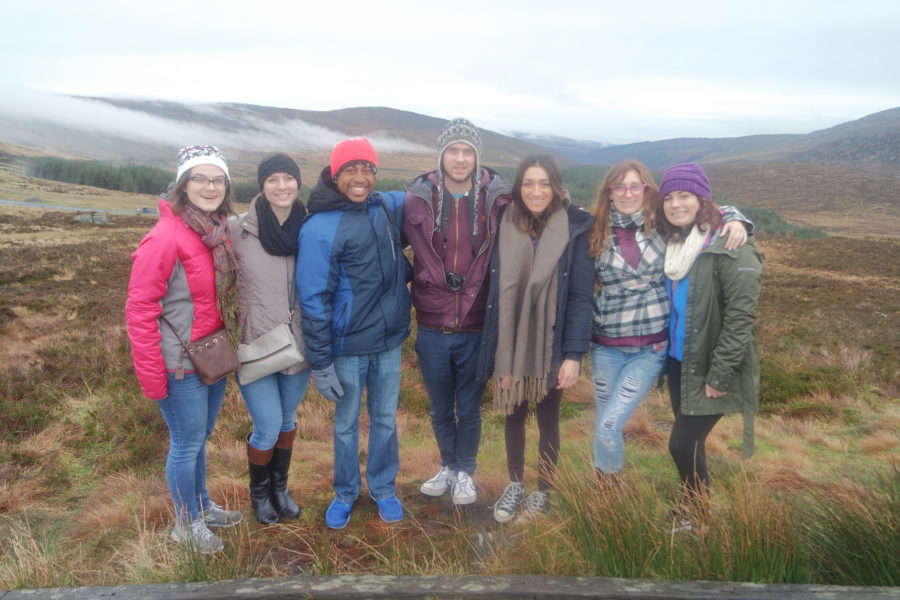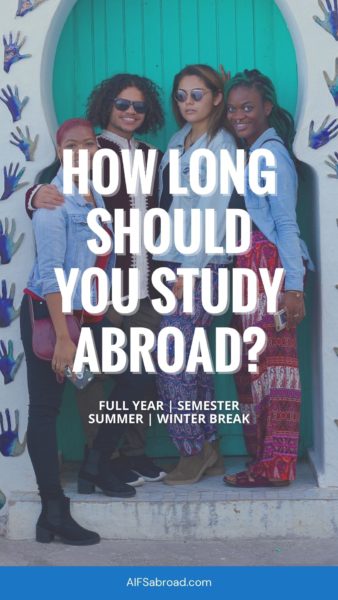Last Updated on February 24, 2023 by AIFS Abroad
How long should you study abroad – for a full academic year, a semester, summer or just a few weeks? It’s a tough question. After all, studying abroad is a big commitment. But fear not! In this blog post, we’ll help you navigate this tricky question and figure out the best program duration for your unique needs.
Let’s dive into your program options and tips for deciding how long you should study abroad:
Summer Study Abroad
3 weeks – 12 weeks long (varies by program)
Many of our summer study abroad programs offer courses over multiple sessions, so you can decide when you want to go abroad or combine sessions for a longer adventure. Lots of students who are super busy with activities or sports at their school like to go abroad during the summer, so they don’t feel like they’re missing out on anything during the regular school year.
Perks:
- Shorter programs can be budget-friendly
- There are lots of Study + Travel programs during the summer so you can visit multiple international cities over the course of about three weeks
- Customize your time abroad – go for one short session or combine sessions for a longer adventure
- You won’t miss any time on your home campus
- It’s a terrific time to boost your resume with a summer internship
Potential drawbacks:
- Might be tourist season, depending on your program location

Semester-Long Study Abroad
3-4 months long on average (varies by program)
Studying abroad for the fall or spring semester is great because you really get to sink your teeth into the experience. You can take a full course load, get to know locals and others on your program, and really adjust to living there. But, longer programs generally cost more, and you have to commit to being away from home for a while.
BONUS: Want a super immersive experience? Study abroad for a full academic year!
Perks:
- Really get to know your program location and its culture
- Possibly more scholarship and financial aid opportunities
- More time for travel and weekend trips while you’re abroad
- You can do a full-time internship abroad or add a part-time internship to your study abroad experience with a Study + Internship program.
Potential drawbacks:
- Longer programs = usually more expensive
- You might deal with a touch of homesickness

January Term Study Abroad
About 2-3 weeks long (varies by program)
If you’re not sure about being away from home for too long, you should consider studying abroad during winter break. January Term programs (also known as J-Term, winter session, intersession or winter term programs) are pretty awesome because you can explore different parts of the world, learn about new cultures, and get a taste of the study abroad experience. It’s like dipping your toes in the water before taking the plunge!
Perks:
- Lower program cost
- Use your winter break to rack up credits
- Less time to get homesick
- You won’t miss any time on campus
- (Probably) avoid peak tourist season
Potential drawbacks:
- Less time to get to know your host city
- Probably not enough time for significant language learning

So… how long should you study abroad?
The answer ultimately depends on your goals and preferences. If you want to gain international experience without missing a full semester of classes at your home university, a summer program may be the best fit for you. If you want to fully immerse yourself in a new culture and gain a deeper understanding of a subject, a semester or academic year program may be the way to go. And if you’re looking for a budget-friendly study abroad program that won’t disrupt your regular schedule, consider a January term program.
Things to consider:
- Financial situation: cost of program and availability of scholarships/grants.
- Your goals. Are you looking for a really immersive experience? Does a certain program fit your academic or career goals perfectly? Do you just want a taste of what studying abroad is like?
- Your level of comfort being away from home.
Here’s the thing – no matter which option you choose, going abroad can be a life-changing experience that will broaden your horizons and help you grow both personally and professionally. So, take the leap and explore the world!

